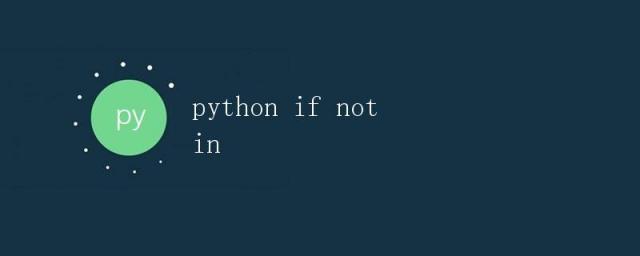Python中的if not in语句
2024年04月26日 Python中的if not in语句 极客笔记
Python中的if not in语句

在Python编程语言中,if not in语句是用来判断某个元素是否不包含在某个容器中的条件语句。通常情况下,我们可以使用if not in语句来检查某个元素是否不在列表、元组、字典或字符串中。在本文中,我们将详细介绍if not in语句的用法并给出一些实例代码。
列表中的if not in
首先,让我们看一个简单的示例,检查列表中是否不包含某个元素:
fruits = ['apple', 'banana', 'orange', 'pear']
if 'grape' not in fruits:
print("Grape is not in the list")
else:
print("Grape is in the list")
运行结果:
Grape is not in the list
在这个示例中,我们首先定义了一个水果列表fruits,然后使用if not in语句检查'grape'是否不在fruits列表中。因为'grape'并没有包含在fruits列表中,所以程序会输出Grape is not in the list。
元组中的if not in
类似地,我们也可以使用if not in语句来检查元组中是否不包含某个元素:
colors = ('red', 'green', 'blue')
if 'yellow' not in colors:
print("Yellow is not in the tuple")
else:
print("Yellow is in the tuple")
运行结果:
Yellow is not in the tuple
在这个示例中,我们定义了一个颜色元组colors,然后使用if not in语句检查'yellow'是否不在colors元组中。由于'yellow'并没有包含在colors元组中,所以程序会输出Yellow is not in the tuple。
字典中的if not in
除了列表和元组,我们也可以使用if not in语句来检查字典中是否不包含某个键值:
person = {'name': 'Alice', 'age': 30, 'gender': 'female'}
if 'height' not in person:
print("Height is not in the dictionary")
else:
print("Height is in the dictionary")
运行结果:
Height is not in the dictionary
在这个示例中,我们定义了一个人员字典person,然后使用if not in语句检查'height'是否不在person字典中。由于'height'并没有作为键包含在person字典中,所以程序会输出Height is not in the dictionary。
字符串中的if not in
最后,我们也可以使用if not in语句来检查字符串中是否不包含某个子串:
sentence = "Hello, world!"
if 'Python' not in sentence:
print("Python is not in the string")
else:
print("Python is in the string")
运行结果:
Python is not in the string
在这个示例中,我们定义了一个字符串sentence,然后使用if not in语句检查'Python'是否不在sentence字符串中。由于'Python'并没有包含在sentence字符串中,所以程序会输出Python is not in the string。
总的来说,if not in语句是一个很方便的Python语句,用于判断某个元素是否不在容器中。通过灵活运用if not in语句,我们可以简洁明了地编写出更加健壮的Python代码。
本文链接:http://so.lmcjl.com/news/3123/